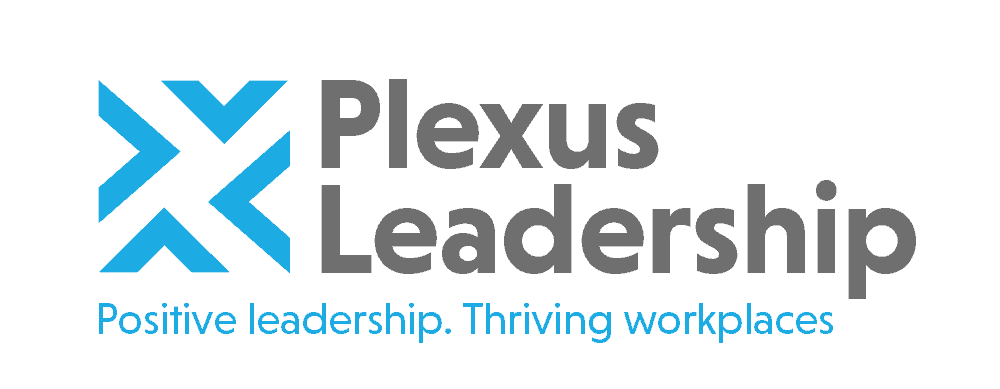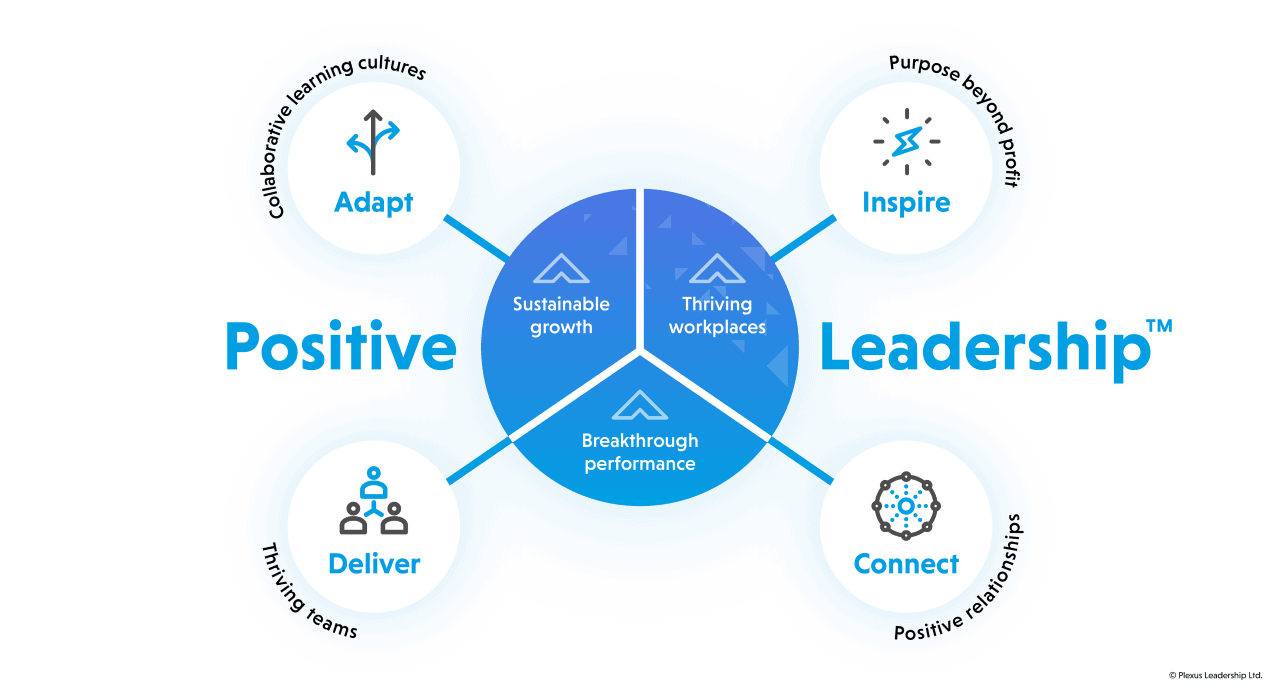Why we need a new approach to leadership?
Rapid and disruptive changes including digital innovation, global competition, and changing customer preferences have disrupted traditional business models and working practices. Organizations set to thrive are more aware than ever that the ability to adapt, and even exploit these changes, is key.
The pandemic has accelerated changing beliefs about how leaders should manage, motivate, and mobilize people. Leaders can no longer just focus on tasks, performance, and results. They need to focus more than ever on building people’s social, emotional, and psychological capabilities to deal with known changes as well as unpredictable events such as Covid.
At the heart of effective change and transformation is strong, human-centered leadership and positive people practices.
What positive leadership is
Positive leadership is a powerful leadership approach that involves leading people in a way that delivers extraordinary outcomes beyond short-term profits by promoting positive behaviours, positive emotions, people’s collective strengths and positive work practices.
Positive leaders inspire people with a meaningful purpose beyond profit, create connected organizations built around positive relationships, deliver exceptional results through thriving teams, and accelerate adaptation with collaborative learning cultures.
What positive leadership isn’t
It is a mistake to view positive leadership as being overly optimistic, a call for visible smiles, or the pursuit of happiness above performance. These are all inaccurate but common misunderstandings about positive leadership. Positive leadership also doesn’t mean so-called negative emotions are ignored, overlooked or glossed over. Positive leaders are usually more tuned into people’s emotions. They encourage people to express their full range of emotions at work and show a high level of support and care for people who are struggling with stress and mental health challenges.
Clear purpose and principles
Positive leaders believe in making a positive difference in the way they lead. Not limited to promoting exceptional experiences for employees and customers, they build sustainable businesses that make the world a better place. In today’s volatile and connected world, they understand the benefits of creating value for all stakeholders, not just customers and shareholders. Therefore, they look to positively impactful their organization, people and planet through their actions and impact.
Positive leaders are guided by clear principles in the way they lead. Some of the stand out principles we see among positive leaders include:
- Inspiring people by creating a shared purpose that is meaningful, worthwhile and makes a positive difference in the world.
- Treating people with respect and showing a genuine concern for their emotional needs and overall wellbeing.
- Building connections and creating a safe space for open and honest dialogue.
- Providing support and showing kindness and understanding when people are struggling.
- Role modelling a learning mindset by encouraging idea sharing, curiosity, experimentation, and continuous growth.
- Promoting the value of discovering and optimizing individual and collective strengths within and across teams.
- Engaging and partnering with all stakeholders to bring about a future that is more positive for all.
- Surfacing and challenging unethical, inappropriate, and unacceptable conduct.
The evidence for positive leadership
Positive leadership builds on the latest psychology about how leaders, teams and organizations thrive and achieve success. It is closely connected to other fast-growing disciplines of organizational psychology including Positive Psychology, Strengths-based Management, Appreciative Inquiry and Transformational Leadership.
Studies consistently show that positive leadership promotes better business outcomes, including higher engagement, reduced turnover, improved wellbeing, ability to adapt to change and improved performance. A great Harvard Business Review article of how positive leadership and work cultures accelerate business results can be found here.
A recent Gallup study involving 1.2 million people across 22 organizations in seven industries and 45 countries found strong evidence between positive, strengths-based leadership practices and positive business results, including:
• 10-19% increased sales
• 3-7% higher customer engagement
• 6-16% lower staff turnover – in low-turnover organizations)
• 22-59% fewer safety incidents
Research by Kim Cameron at the University of Michigan showed that when teams apply positive work practices in the way they work together, they achieve significantly higher levels of performance, customer satisfaction, and productivity.
Positive leadership in action
Some of the world’s most successful companies employ various aspects of positive leadership and positive people practices.
Microsoft credits its business and cultural transformation to growth mindset, which inspires staff to be curious and seek ongoing development. Growth mindset is central to the company’s new leadership framework. This is articulated in Microsoft’s mission statement: “to empower every person and every organization on the planet to achieve more”. By rejecting the idea that talent is fixed, Microsoft provides opportunities for individuals to challenge themselves and experience different roles, identifying potential leaders in the process.
Netflix pursues creative and positive corporate practices, which includes giving employees the autonomy to take as much time off as they like but expecting them to act in the company’s best interest. This empowers people, promotes positive attitudes and behaviours and motivates excellence.
Facebook practices a strengths-based approach to talent management. Shifting the corporate focus away from individuals’ weaknesses, the business matches employees’ strengths and skills with challenges that enable them to do their best work.
Atkins, one of the world’s most respected engineering and project management consultancies uses several strengths-based people management practices in the way they hire, develop and engage people. By introducing a strengths-based recruitment approach they have increased the number of applications for key roles, improved diversity and made the hiring process more engaging for candidates and interviewers alike.
Positive leadership delivers better outcomes in times of change
Change is inevitable, yet current leadership training and development models are not creating positive leaders ready to embrace and exploit it. Where organizations are unable to adapt in times of uncertainty and rapid change, business growth is stunted, and long-term survival is at risk. Disruption can be a great leveller for businesses, creating opportunity for organizations to innovate and emerge stronger. However, this is only possible with capable leaders at the helm who can inspire teams and build thriving workplaces capable of responding to unprecedented change.
Developing positive leadership has proven to be effective for motivating teams and supporting strong business growth in some of the world’s most successful organizations. Driven by their own strong purpose, positive leaders channel their positive belief about human potential and growth into building working environments that support others to thrive and achieve their full potential.
By promoting supporting and caring environments that enable people to be themselves, share their opinions and ideas more freely, and play their strengths, positive leaders accelerate performance and engagement. Positive work practices also act as a buffer against stressful events and setbacks, improving people’s wellbeing, resilience and ability to overcome challenges.
Together with delivering near term plans, positive leaders look to build sustainable businesses that leave a lasting positive legacy and impact on employees, customers, and the planet. By empowering people to achieve their full potential, positive leaders create the next generation of leaders ready to succeed. They demonstrate remarkable stewardship, leaving the world a better place than they found it.
For more on how positive leadership can help your organization navigate change, download our Positive Leadership White Paper.
Other Posts

About the Author
James Brook
Founder and MD | Leadership Consultant | Organizational Psychologist
James is a leadership consultant, organizational psychologist and executive coach. He has over 25 years’ experience working with leaders, teams and organizations globally to optimize their performance, talent and future success. He specializes in positive leadership, thriving workplaces, collaboration and influencing, organizational change and transformation, accelerating innovation and coaching executives and leaders in innovative sectors including Tech, Digital, E-commerce and Life Sciences.
James has supported, advised and coached leaders and teams globally across diverse industries and geographies. Clients he has worked with include Allen & Overy, Commvault, Equinor, Facebook, GSK, Hilton, John Lewis, Novartis Pharmaceuticals, NHS, Oracle, Sainsbury’s, Swiss Re, Tesco, Takeda Pharmaceuticals, WSP and Yahoo!.
James has a Master’s in Organizational Psychology, an MBA, an Advanced Diploma in Executive Coaching and a Harvard Business qualification in Sustainable Business Strategy. He is a member of the Institute of Directors, the Association of Business Psychologists and a Fellow of the Chartered Institute of Personnel and Development (FCIPD). He is currently undertaking a PhD in Organizational Psychology examining the start-up experiences of Tech and Digital entrepreneurs.






